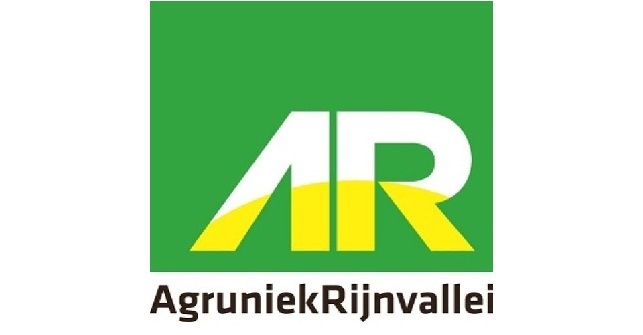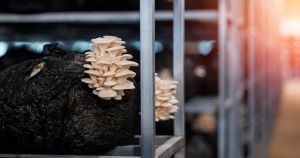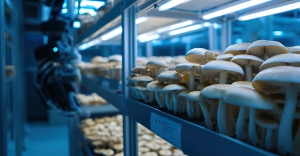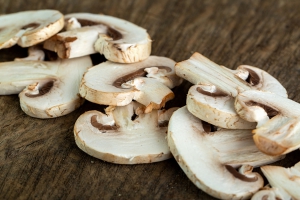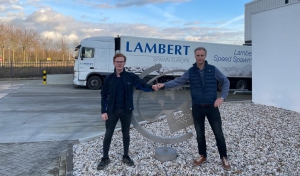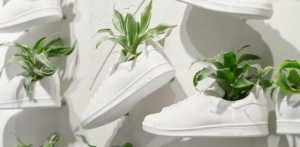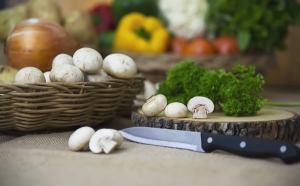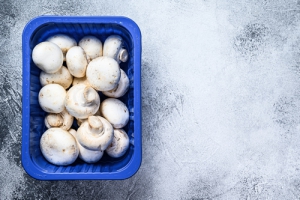The mushroom industry has always been an example of how biology and ingenuity can coexist. What started centuries ago as a craft based on observation, experience, and intuition is now rapidly evolving into a field where data and digital technology drive every decision. The next generation of mushroom farms is taking shape, intelligent, connected, and remarkably sustainable.
Automation becomes accessible
Until recently, automation was something only large farms could afford. Complex climate control systems, robotic picking solutions, and data-driven monitoring platforms were impressive but often out of reach for smaller growers. That landscape is now changing. As technology becomes more affordable and modular, small and mid-sized farms can adopt automation step by step, from simple environmental sensors to cloud-based farm management systems.
These tools help growers maintain stable growing conditions, reduce labor costs, and minimize waste. More importantly, they allow farmers to focus on the art of cultivation, rather than on manual data collection or repetitive control adjustments.
Smarter growing through data
Every mushroom tells a story of temperature, humidity, substrate composition, and microbial balance. By collecting and interpreting this data, growers can now understand their crops better than ever before. Artificial intelligence (AI) is entering the scene, helping to predict yields, identify anomalies early, and even recommend optimal growing cycles.
Imagine a system that learns the behavior of your farm, adjusting CO₂ levels, light exposure, or irrigation based on previous flushes while alerting you to subtle changes that might affect productivity. That’s not science fiction anymore; it’s the emerging reality of smart mushroom cultivation.
The rise of AI-assisted strain development
While climate control and automation enhance the growing environment, artificial intelligence could soon reshape what we grow. AI-assisted strain selection combines genomic data, performance tracking, and environmental inputs to identify which varieties thrive under specific conditions. This opens the door to developing new strains faster, with higher yields, better shelf life, or specific nutritional or medicinal properties.
For mushroom breeders and spawn producers, this digital layer adds precision to what has long been an art form, bridging traditional mycology with computational biology.
Transparency and traceability through blockchain
Consumers today want to know where their food comes from and mushrooms are no exception. Blockchain technology can bring new levels of transparency to the supply chain. From substrate sourcing to post-harvest logistics, each step could be securely logged, offering proof of sustainability, origin, and quality.
For growers, it’s also a way to build trust with buyers and regulatory bodies, simplifying certification and export documentation. In a world where sustainability is not just a value but a requirement, such traceability systems will likely become standard practice.
Sustainability: the core of innovation
At the heart of all this progress is a shared commitment to sustainability. Automation and digitalization are not replacing the grower, they’re empowering them to produce more efficiently, use fewer resources, and reduce waste. From optimizing substrate recipes to recycling heat and water within facilities, smart systems are helping farms close the loop.
The mushroom sector has always been a pioneer in circular agriculture. Now, by integrating technology, it is showing that environmental responsibility and innovation can grow side by side.
A future rooted in tradition and technology
The message is clear: the future of mushroom farming is intelligent, data-driven, and sustainable. Yet the essence of the craft remains unchanged, understanding living organisms and creating the conditions for them to thrive. By combining centuries-old cultivation wisdom with 21st-century technology, the mushroom industry continues to prove that innovation grows best on a fertile foundation.
Published by Mushroom Matter: connecting the global mushroom community through insight, innovation, and inspiration
As the mushroom industry continues to evolve, one of the most exciting frontiers is happening beneath the surface, literally. The development of smarter, more sustainable substrates is redefining how mushrooms are cultivated, improving efficiency, productivity, and environmental impact all at once.
The hidden power of the substrate
Every mushroom farmer knows that success begins with the substrate. It’s not just a growing medium, it’s the foundation of the entire production process. Traditionally made from agricultural by-products such as straw, manure, or sawdust, substrates are now being optimized through a combination of science and technology.
Researchers and commercial producers alike are exploring new blends that enhance nutrient availability, moisture retention, and microbial balance. These improvements allow mushrooms to grow faster, stronger, and with more consistent quality across flushes.
Data meets biology
Technology is playing a crucial role in unlocking the full potential of substrate science. Precision monitoring tools, AI-driven analysis, and smart sensors are allowing farmers to better understand what’s happening at the microbial level.
By analyzing temperature profiles, CO₂ emissions, and biological activity in real time, growers can fine-tune conditions to ensure optimal colonization and fruiting. This data-driven approach helps reduce energy costs, minimize contamination, and ultimately increase yields, all while maintaining product quality.
Sustainability from start to finish
The move toward sustainable substrates reflects a broader shift in the mushroom industry toward circularity. Agricultural waste streams, such as coffee grounds, brewery grains, and nut shells, are being repurposed as feedstock for mushroom cultivation.
After harvesting, spent mushroom substrate (SMS) is being given new life as compost, animal feed, or soil enhancer, closing the loop in a truly regenerative production model. This approach not only reduces environmental impact but also creates added value from every stage of the cultivation cycle.
Growing smarter, not harder
As consumer demand for mushrooms and functional fungi continues to rise, the industry’s ability to innovate from the ground up will define its future. The next generation of substrates, designed with precision, sustainability, and circularity in mind, will help growers meet global demand efficiently and responsibly.
In the world of mushrooms, it’s clear that what happens beneath the surface can make all the difference above it.
Published by Mushroom Matter: connecting the global mushroom community through insight, innovation, and inspiration
The mushroom industry is entering a digital era. What was once guided solely by intuition, experience, and manual labor is now increasingly supported by sensors, automation, and data analytics. From substrate preparation to harvest, smart farming tools are reshaping how fungi are grown, making production more precise, efficient, and sustainable than ever before.
Precision growing in every layer
Inside modern growing rooms, environmental control systems are evolving into intelligent ecosystems. Sensors monitor temperature, humidity, CO₂ levels, and air circulation in real time. Artificial intelligence (AI) algorithms then adjust these factors automatically, ensuring ideal conditions for each growth phase.
This precision doesn’t just boost yields, it reduces energy consumption and minimizes human error. Instead of reacting to issues after they occur, farmers can anticipate and prevent them, achieving higher consistency and quality across crops.
Data as the new substrate
For decades, mushroom cultivation relied heavily on experience, the grower’s eye and intuition. Those remain invaluable, but now they’re being amplified by data. Smart platforms can collect thousands of data points per day, translating them into actionable insights: when to ventilate, irrigate, or adjust temperature.
Some farms use cloud-based dashboards that visualize performance across different growing rooms or even multiple sites. Others are experimenting with machine learning to recognize growth patterns and predict harvest times with remarkable accuracy.
In short, the farm is learning, and so are the fungi.
Automation lightens the load
Labor shortages have long been a concern in the mushroom sector. Smart technologies are helping to bridge that gap. Automated systems can handle repetitive or heavy tasks such as substrate loading, climate adjustments, or even mushroom picking with robotic precision.
While full automation isn’t feasible for every operation, even partial adoption, for example, using camera-guided monitoring or automated watering, significantly reduces workload while improving consistency. The result: growers can focus more on strategy, quality, and innovation instead of routine maintenance.
A sustainable shift
Beyond efficiency, smart farming supports a more sustainable production model. By fine-tuning environmental parameters, farms use less energy and water. Precise climate control minimizes waste, and optimized substrate management helps reduce contamination rates.
For forward-thinking producers, data also helps demonstrate sustainability performance to customers and investors, turning eco-efficiency into a measurable, marketable advantage.
The human touch remains
Even in the smartest farms, technology doesn’t replace people, it empowers them. Successful growers combine digital insights with hands-on experience and instinct. The art of mushroom cultivation remains rooted in understanding living organisms; technology simply provides new tools to nurture them better.
The road ahead
Smart farming in mushrooms is still in its early stages, but the direction is clear. With each innovation, whether AI-driven control, autonomous harvesters, or cloud-based analytics. the boundary between biology and technology grows thinner.
As these systems become more accessible and affordable, farms of all sizes can benefit from the data revolution. The result? Smarter farms, smarter fungi, and a more resilient, sustainable future for the entire mushroom industry.
Published by Mushroom Matter: connecting the global mushroom community through insight, innovation, and inspiration
Peat-free casing soils for mushroom cultivation
- Mushroom growers fear for their existence and researchers are looking for environmentally friendly alternatives. You can watch the episode here.
-
Ms. Natalie Rangno (IHD Dresden) on the development and practical testing of peat-free casing soils as part of the MykoDeck project. You can watch the episode here.
For more information about this project, click here.
Soon we will also be able to build houses with the influence of mushrooms.
Researchers have made a brick from mushrooms. The building material we know today is not good for the environment due to the emission of carbon dioxide. This 'mushroom brick' in below video of Verge Sience is carbon neutral and you can see how this stone was created.
Students develop potato chips based on mushrooms
In May 2020, the Shiitake Biltong team from Maastricht took part in the student competition Ecotrophelia. They have continued to develop new food products. Soon they hope to start their own company that will enter the market with potato chips based on mushrooms.
For Ecotrophelia, the group of Maastricht students presented a vegetarian variant of the biltong which is popular in South Africa; a snack consisting of dried strips of meat that resembles beef jerky. The students won the Dutch final with it and were also allowed to present the idea during the European final.
After the team took another critical look at the idea, the students came to the conclusion that shiitake as a raw material was not such a smart choice. Good shiitake is hard to get and must be imported from Asia. That is expensive and not really sustainable.
The team went back to work and now opted for raw materials from a Dutch residual flow. They developed mushrooms based on pieces of sliced mushrooms. The idea has been elaborated in a business plan, contacts have been made with suppliers, buyers and a possible producer. At this time the production process is optimized and the students are about to start their own company.
Source: Foodholland (article is in Dutch)
Since May 2019, after it’s festive opening, the Lambert Spawn plant in The Netherlands is operative and has been supplying the European, Russian and Chinese market since then. Ies Hooglugt and his team have been improving and increasing the sales step by step.
On January 1st 2021 Guido Stevens joined the Lambert Spawn family. Guido Stevens will be responsible for the sales, customer service and other commercial activities. This will give Ies Hooglugt the chance to invest more time in the development of the company, new markets and innovations. Guido has worked for 4 years in the mushroom industry in positions within export and sales He is 27 years young, enthusiastic and full of new ideas; and brings a broad experience in sales, export, marketing and customer service to the table.
Lambert Spawn is market leader in Northern America and wants to increase it’s market share in Europe, Russia, Middle- and Far East. With their premium quality products they have been the mushroom growers resource since 1919, when Lambert Spawn was founded as America’s oldest independent spawn company. But; with the most modern spawn factory in the world.
Premium quality products and customer service are two important pillars of Lambert Spawn. Therefor Lambert Spawn will keep investing in both of these areas to bring even more additional service to their partners worldwide. Consultation and guidance in combination with premium quality spawn to reach the best yields will be the key.
For more information feel free to visit their website.
And you can also follow their Facebookpage.
Adidas has announced it’s launching a line of sneakers made from mushroom-based leather.
As part of a 2021 sustainability initiative from Europe’s largest sportswear manufacturer, the new Stan Smiths will be entirely vegan, and created using mycelium: that is, the vegetative part of fungi that produces mushrooms.
On December 28, the German multinational announced that “adidas seeks to break new ground: Together with partners, adidas is developing a new material, a purely biological leather alternative made from mycelium, and will use it for the very first time in the creation of footwear.”
This isn’t the company’s first foray into vegan footwear. In 2020, Adidas launched plant-based versions of several classic sneakers, which quickly became bestsellers. Now it’s completely renounced the use of fur in all products, and it’s working with partners on other sustainability projects that include recycling cotton and developing a “particularly climate-friendly running shoe” as part of a drive that will see 60% of all Adidas products in 2021 being made with sustainable materials.
Please read the full article here.
Source: Good News Network
South Mill Champs expands mushrooms processing capabilities with the acquisition of The Mushroom Company
The Mushroom Company is one of North America's largest mushroom processors. Over the last 90 years it has built a reputation for high-quality, innovative products and superior dedicated customer service. The Mushroom Company's product capabilities range from individually quick-frozen (IQF) to canning, blanching, blending, and roasting mushrooms and other vegetables. It primarily serves the food service and industrial markets, where its mushrooms end up on pizzas, in soups, and on various quick and casual-service restaurant menus.
"We are excited to join the South Mill Champs family," said Dennis Newhard, President of The Mushroom Company. "Over the last few years, SMC has shown exceptional leadership in innovation and growth in the mushroom industry. We look forward to supporting and further expanding SMC's capabilities and product innovation. Our industry is experiencing strong growth as consumers continue to recognize the significant health and environmental benefits of mushrooms. We believe the future is bright and this combination gives us the resources to continue to be an industry leader."
Please read the full article here.
Source: South Mill Champs
Blue mushroom trays exit
Blue mushroom trays will be removed from the shelf and will be replaced by circular packaging
The famous blue mushroom trays are sold from supermarkets. Verstappen developed a new packaging line for mushrooms and mushrooms for Albert Heijn. The trays are completely transparent and consist of 100% recycled PET bottles. With this, Verstappen is taking another step in making business operations and the production of packaging materials more sustainable.
Circular process
The new packaging from Verstappen contributes to the circular economy to which the company attaches great value. Mieke Verstappen, director of Verstappen explains: “The great thing about this innovation is that the plastic used has already been in the shops as consumer packaging and is extremely suitable for making new food packaging. In this way we can permanently reuse the material. A perfect example of the circular economy. ”
Please read the full article (in Dutch) here.
Source: Duurzaam Ondernemen




